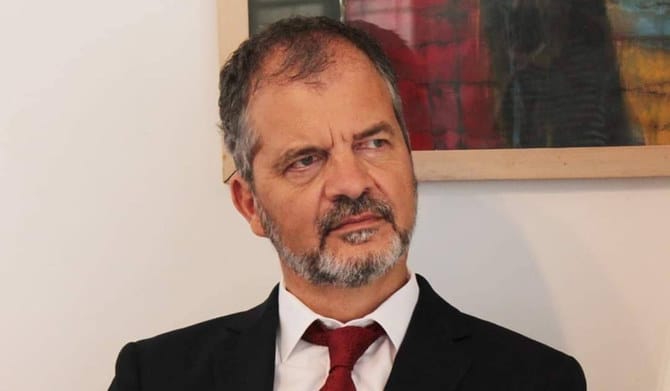
Detained
About
Position / Party / Association: Political activist and former leader of the Ettakatol Party
Year of birth: April 1965
Profession: Financial expert and analyst
Nationality: Tunisian/Spanish
Lawyer: Abdelaziz Essid
Date Targeted
March 11, 2023
Current Status
Detained
Charges
Participation in a group intended to alter the nature of the state and conspiracy against the internal security of the state.
Cases and Violations
Conspiracy case (1)
Turki is being held under 10 articles of the Tunisian Penal Code – including Article 72, which provides for the death penalty for attempting to “change the nature of the state” and over 12 articles of the 2015 anti-terrorism law.
Incident: In a video-recorded speech published on February 14, 2023 on the official Facebook page of the Presidency of the Republic, President Kais Saied described the detainees in the so-called conspiracy case as “terrorists” and accused them of conspiring to undermine the state and manipulate food prices to stir up social tension.
https://www.facebook.com/Presidence.tn/videos/609398257754747
Competent judicial authority: Judicial Anti-terrorism pole
Procedures and violations: February 11, 2023: Khayam Al-Turki’s home was raided, and be was arrested and taken to an unknown destination by the and anti-terrorism police.
Abdelaziz Essid, Al-Turki’s lawyer, said that his client’s house was raided and searched at dawn by security agents who did not disclose the security agency that assigned them to carry out the raid, highlighting that his client was taken to an unknown destination and without the knowledge of the Public Prosecution.
Authorities initially prevented lawyers from meeting with him under the 2015 anti-terrorism law.
A judge in the anti-terrorism judicial branch, which is investigating him, interrogated him about his meetings with the rest of the defendants and with foreign diplomats. The evidence presented against the detainees in the case includes messages on their mobile phones about conversations with foreigners, including diplomats, as well as messages exchanged between the defendants about the possibility of mobilizing opposition to what they called President Saied’s “coup.” All of these acts are protected by the rights to freedom of expression, association and assembly, which the Tunisian authorities are obligated to respect under international human rights law.
February 24, 2023: The investigating judge at the Anti-Terrorism Judicial Pole issued 3 detention warrants against Turki. Lawyer Samir Dilou indicated that the defense team decided to boycott hearings due to the absence of the most basic conditions for a fair trial, explaining that it had become clear that the decisions had been made in advance and that the presence of lawyers was merely attempting to add lefitimacy to what was happening, according to him.
March 10, 2023: Al-Turki went on a brutal hunger strike with a number of detainees in the conspiracy case due to what they said was a “policy of abuse” to which they were subjected inside the prison.
July 10, 2023: The indictment chamber of the Tunisian Court of Appeal decided to reject the defense’s request regarding the release of Khayam Al-Turki, Issam Chebbi, Abdelhamid Jelassi, Ridha Belhaj, Ghazi Chaouachi, and Jawhar Ben Mbarek.
September 20, 2023: The indictment chamber responsible for examining terrorism cases at the Tunisian Court of Appeal ruled “to reject in principle” the appeal filed before it against the decision of the investigating judge at the Financial Judicial Pole to extend the precautionary detention for a period of four months against the defendants detained pending trial in the case related to forming a group for the purpose of conspiracy against state security, including Khayam Al-Turki. The Indictment Chamber also decided to “reject in form” the demands for the release of the detained defendants and to return the case file to the investigating judge at the Anti-Terrorism Judicial Pole for further investigation.
September 28, 2023: The first investigating judge in the 36th Office of the Anti-Terrorism Judicial Pole issued a decision prohibiting media coverage of the two suspected cases of conspiracy against state security, including the Khayam al-Turki case.
Breaches: Very poor living conditions: Lawyer Ines Harrath stated, in her Facebook post, after visiting Jawhar Ben Mbarek, Ridha Belhaj, Issam Chebbi, Ghazi Chaouachi, and Lazhar Akremi, and after meeting colleagues who visited Al-Turki, that they were “deprived of the right to wash and exercise, and they were transferred to extremely dirty rooms full of insects and not equipped with any sanitary facilities, as human needs must be relieved in a hole on the floor, in addition to depriving the prisoner of the most basic rights such as treatment,” she asserted. Ines Harath also considered that “there are orders from the regime to the prison administration to endanger the lives of political detainees by placing them with carefully selected common crime prisoners, most of whom were imprisoned for premeditated murder cases,” according to what was stated in her blog post.
